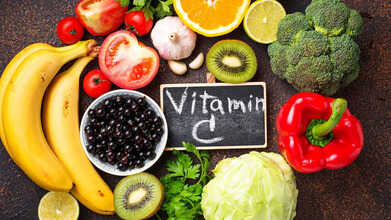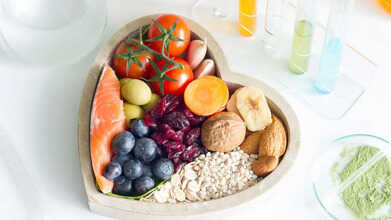- Health Conditions A-Z
- Health & Wellness
- Nutrition
- Fitness
- Health News
- Ayurveda
- Videos
- Medicine A-Z
- Parenting
- Web Stories
Does The Kind Of Oil You Use While Cooking Eggs Matter?

Are eggs cooked in oil healthy? (Credit-Canva)
A simple egg for breakfast can be a powerhouse of nutrition while it may seem like a normal breakfast for many, it gives you a big protein boost which kickstarts your metabolism and keeps you feeling full and energized throughout the morning. This protein is very important for building and repairing tissues, which makes eggs a valuable part of a balanced diet. But the way you prepare your eggs can significantly impact their taste and texture. many people try microwaving to avoid using oils or butter which is convenient, but making it this way can make the eggs have a rubbery, almost spongy consistency that many find unappetizing.
On the other hand, hard-boiling an egg is a classic method, but once you make it everyone at your home will be able to tell as well as it leaves a smell, this lingering sulfuric odor in your kitchen isn't always pleasant. When people are making eggs they are looking to achieve that perfect balance of creamy and slightly firm texture is often and the way you chose to make your eggs can matter. So people chose to go for fried eggs or omelet any commercially available oils are refined or high in saturated fat, raising health concerns. For sautéing eggs, olive oil and avocado oil are preferable due to their lower saturated fat content and presence of heart-healthy omega-3 fatty acids. (It's worth noting the importance of verifying the authenticity of extra-virgin olive oil.)
Importance of Smoke Point
Careful monitoring of stovetop cooking is crucial, particularly with extra-virgin olive oil, which has a lower smoke point compared to avocado oil and highly refined oils like canola, vegetable, and corn oil. While olive oil is rich in antioxidants, heating oils beyond their smoke point can release potentially harmful carcinogens and free radicals.
High heat can create desirable crispness in eggs and other foods, but the choice of oil is critical. Highly refined oils are often chosen for their high smoke points, which make them more stable at high temperatures. While some refined oils, like soybean or canola oil, may appear healthy due to their lower saturated fat content, they can contain trans fats. Trans fats negatively impact cholesterol levels by raising LDL ("bad") cholesterol and lowering HDL ("good") cholesterol.
Furthermore, the refining process (involving heat, pressure, and chemicals) strips away antioxidants and nutrients. However, "cold-pressed" refined oils, such as refined olive or avocado oil, retain more nutrients and have higher smoke points. Refined avocado oil, in particular, boasts one of the highest smoke points, making it a good choice for high-temperature egg cooking.
Coconut Oil: Is It a Healthy Choice for Eggs?
Coconut oil is relatively stable at high temperatures due to its high saturated fat content. Refined coconut oil has a higher smoke point than unrefined. While popular in ketogenic and Paleo diets, and offering a distinct flavor, coconut oil's health benefits are often overstated. Claims about coconut oil's health benefits often refer to a specific type containing medium-chain triglycerides (MCTs), which are quickly metabolized into energy and promote feelings of fullness. However, most commercially available coconut oil primarily contains lauric acid, not MCTs.
A 2020 review in Circulation found that coconut oil significantly increased both LDL and HDL cholesterol levels. While an increase in HDL can be positive, the overall conclusion was that coconut oil should not be considered beneficial for reducing cardiovascular disease risk.
Soaked vs. Dry Raisins: Nutritionists Reveal Which Packs More Benefits

Credits: Canva
Raisins, made by drying grapes, are a popular snack loved for their natural sweetness and nutrient content. While people enjoy them both dry and soaked, how you consume them can influence not only their taste but also the health benefits they provide.
Incorporating soaked raisins into your daily routine is simple and versatile. You can enjoy them plain in the morning, mix them into your breakfast oats or yogurt, or even add them to smoothies and salads. Just a small handful can make a noticeable difference in energy levels, digestion, and overall vitality. Over time, this small change can support long-term wellness, making soaked raisins an easy and effective addition to a balanced, health-focused lifestyle. So which option is truly better for your body, soaked or dry raisins?
To get some clarity, we spoke with Celebrity Ayurvedic Nutritionist Shweta Shah, founder of Eatfit24/7, who explained which form offers more advantages for overall wellness.
Soaked vs. Dry Raisins: What’s Healthier?
Raisins are packed with nutrients like iron, antioxidants, and natural sugars that support general health. According to Ayurveda, soaked raisins tend to offer greater benefits than dry ones. Nutritionist Shweta Shah shared why this is the case and when dry raisins might still be useful.
Soaking raisins overnight can unlock their full nutritional potential. Shah explains, “Dry raisins contain phytic acid, which can prevent your body from absorbing important minerals like calcium and iron. Soaking helps reduce this effect, allowing your body to take in nutrients more effectively.”
Benefits of Soaked Raisins:
- Better Nutrient Absorption: Soaking reduces phytic acid, making minerals like iron and magnesium easier for the body to absorb.
- Easier Digestion: Soaked raisins soften and are gentler on the stomach, making them ideal to eat on an empty stomach in the morning. “They help stimulate digestive fire without causing excess heat in the body,” adds Shah.
- Cooling Effect: While dry raisins can have a warming effect, soaking them in water makes them cooling. This can help with acidity, constipation, and even skin issues.
- Supports Liver Detox: Soaked raisins or raisin water work as a mild detox, promoting better liver function, improved metabolism, and reduced toxin buildup.
When Dry Raisins Might Be Preferable
Although soaked raisins have many benefits, dry raisins also have their uses. Shah points out that they can be helpful in certain situations:- During cold weather, to provide natural warmth
- For people with strong digestion
- As a quick energy source while trekking, fasting, or during active routines
However, she warns that eating too many dry raisins, especially in hot weather, can cause heat-related issues like ulcers, skin irritation, and acidity.
In short, soaked raisins aren’t just a morning habit, they are an Ayurvedic tonic packed with cleansing, cooling, and nourishing benefits. As Shah notes, “Soaking raisins for 6–8 hours turns them into a powerful wellness booster that aids digestion, detoxification, and women’s health.” Whether you want to improve digestion, cool your system, or simply start the day on a healthy note, a handful of soaked raisins might be the perfect choice.
This Everyday Vegetable Has More Vitamin C Than Oranges To Fight Colds and Flu

Credits: Canva
If you are someone who loves vitamin C and often eats it to keep your viruses at bay, there is some good news for you, that there is a vegetable available that can do a much better job than an orange. Moreover, our diet plays a pivotal role in maintaining a robust immune system, which is responsible for warding off infections. If your immune system is healthy, you're less likely to get sick , and if you do catch a bug, your body will be better equipped to fight it off swiftly. Thus, Including the right amount of vitamin C in your daily diet is thought to help reduce the duration of colds.
This Vegetable Is More Beneficial Than Orange For Vitamin C
When it comes to getting enough vitamin C, oranges have reigned supreme as the go-to source. And with 70 milligrams of vitamin C in one medium-size navel orange, per the USDA, one orange is almost all you need to meet your daily dose (according to the National Institutes of Health, the suggested daily intake for vitamin C is 75 mg for women and 90 mg for men).
As per Mirror UK, Bell peppers contain 80.4mg of vitamin C per 100g, outstripping lemons, which have just 53mg for the same weight. Oranges also contain 53.2mg per 100g, while grapefruits offer 31.2mg. Incorporating a wide array of fruits into your diet is beneficial, and it's certain bell peppers are a great addition. So the experts now suggest, just a 50g serving can fulfil the daily advised intake of 40mg.
Importance Of Vitamin C For Body
Vitamin C is essential for the body because it serves as a powerful antioxidant, supports the immune system, and is crucial for the synthesis of collagen, which is vital for wound healing and the maintenance of healthy skin, bones, and blood vessels. It also enhances the absorption of iron from plant-based foods and protects cells from damage caused by free radicals, potentially reducing the risk of chronic diseases like cancer and heart conditions.
As per National Institute of health, Vitamin C is required for the biosynthesis of collagen, L-carnitine, and certain neurotransmitters; vitamin C is also involved in protein metabolism . Collagen is an essential component of connective tissue, which plays a vital role in wound healing. Vitamin C is also an important physiological antioxidant and has been shown to regenerate other antioxidants within the body, including alpha-tocopherol (vitamin E).
Because vitamin C can limit the damaging effects of free radicals through its antioxidant activity, researchers are examining whether it might help prevent or delay the development of diseases in which oxidative stress plays a role, such as certain cancers and cardiovascular disease (CVD). In addition to its biosynthetic and antioxidant functions, vitamin C plays an important role in immune function and improves the absorption of nonheme iron, the form of iron that is present in plant-based foods. Insufficient vitamin C intake causes scurvy, which is characterized by fatigue or lassitude, widespread connective tissue weakness, and capillary fragility.
While oranges remain a healthy choice, this often-overlooked vegetable proves to be an even stronger ally for your immune system. By adding it to your meals, you give your body an extra layer of protection during flu season. Simple changes like this can make a real difference in keeping colds at bay and maintaining good health year-round.
World Heart Day 2025: Nutritionist Reveals Heart-Healthy Foods You Must Eat And Avoid

Credits: Canva
When it comes to your heart, diet plays a crucial role. What you eat directly affects your heart health, helping it function better and reducing the risk of disease. Heart-healthy eating focuses on including nutrient-rich foods while cutting back on items that can harm your heart, such as foods high in saturated fat, added sugar, or salt. For World Heart Day, we spoke with a dietician to understand which foods support a healthy heart and which ones are best limited.
Best Food To Eat For A Healthy Heart
A heart-friendly diet revolves around fresh, wholesome foods. We got in touch with Anshul Singh, Team Leader, Clinical Nutritionist,Artemis Hospitals who told us some of the most beneficial options include:
- Vegetables: Leafy greens like spinach, kale, collard greens, and cabbage, as well as broccoli and carrots.
- Fruits: Apples, bananas, oranges, pears, grapes, and prunes.
- Whole grains: Brown rice, whole-grain bread or tortillas, and plain oatmeal.
- Low-fat dairy: Milk, cheese, and yogurt with little or no fat.
Protein-rich foods:
- Fish rich in omega-3s such as salmon, tuna, and trout.
- Lean meats like skinless chicken, turkey, or pork tenderloin.
- Eggs.
- Plant-based proteins like tofu, legumes (lentils, chickpeas, kidney beans), nuts, and seeds.
Healthy fats: Foods rich in monounsaturated and polyunsaturated fats are excellent for the heart. These include:
- Oils such as olive, canola, corn, safflower, sunflower, and soybean oil.
- Nuts and seeds like almonds, walnuts, pine nuts, pumpkin, sesame, and flax.
- Avocados, salmon, trout, and nut butters.
Foods To Avoid For A Healthy Heart
To protect your heart, it’s important to reduce intake of salt, saturated fats, added sugars, and alcohol. Here’s how to manage these in everyday life, as per Anshul Singh, Team Leader, Clinical Nutritionist,Artemis Hospitals:
Limit Sodium:
Adults and children over 14 should aim for less than 2,300 mg of sodium per day. Younger children may need even less. Those with high blood pressure may need stricter limits. Tips to reduce sodium include:- Check nutrition labels and choose products with lower sodium.
- Opt for fresh, frozen, or no-salt-added foods rather than pre-seasoned, marinated, or processed items.
- Cook at home when possible so you can control salt levels.
- Use herbs and spices instead of salt for flavor.
Cut Back on Saturated Fats:
“Bad” fats are mostly found in animal products like butter, cheese, and fatty cuts of meat. Saturated fats should account for less than 10% of daily calories. Instead:- Choose lean, skinless meats.
- Switch to lower-fat dairy options.
- Use vegetable oils like olive or canola instead of butter, lard, or coconut and palm oils.
Reduce Added Sugars:
Added sugars are those that are added to foods during processing or preparation, not naturally occurring in items like fruits. Limiting these helps you eat more nutrient-rich foods and stay within your daily calorie goals. Common forms of added sugar include brown sugar, high-fructose corn syrup, sucrose, dextrose, and raw sugar.By focusing on nutrient-dense foods, balancing your intake of fats, and being mindful of salt and sugar, you can give your heart the care it needs. Small adjustments in your diet can go a long way in keeping your heart healthy, strong, and resilient.
© 2024 Bennett, Coleman & Company Limited

